
The mishna in Taanit (4:6) lists five events that occurred to our ancestors on Shiv'a Asar b'Tamuz and five events that occurred on Tish'a b'Av.
Among the events of 17 Tamuz, is the cessation of the daily Tamid.
The mitzva of bringing the twice daily T'midim is mentioned in Parshat T'tzaveh, but is counted as one of the Taryag mitzvot in this week's sedra of Pinchas.
We read of the command to bring the T'midim each year, 2, 4, or 6 days after the 17th of Tamuz, or a day or three before, or on the 17th day of Tamuz itself. (This is correct for Israel; in Chul there is a slight variation - no need to detail it now.)
This means that we read of the command to bring the T'midim and mark the day the T'midim ceased, following an unbroken streak that began at Sinai and continued even during the Babylonian siege of Jeru- salem... until that fateful Shiv'a Asar b'Tamuz.
We need to understand why this detail - among many others - is singled out by the mishna to highlight the tragic and mournful aspects of our Aveilut HaChurban, our national mourning for the destruction of the Beit HaMikdash.
For the answer (better to say, part of the answer), let us look at the pasuk that is referred to in the title of this Lead Tidbit. Bamidbar 28:6.
It is a continual burnt-offering, which was offered in Mount Sinai, for a sweet savour, an offering made by fire unto HaShem.
The commentaries understand that the pasuk was making a connection between the T'midim and the sacrifices offered at Har Sinai right before Matan Torah.
Let us leave those details for another time, and derive a lesson from the T'midim a bit differently.
The twice-daily lamb-offerings in the Mikdash were communal korbanot. They represent our commitment as individuals and as part of Klal Yisrael to G-d, to His Torah and Mitzvot, to His People and to His Land.
This perpetual offering began at Sinai. It represents the promises all of Israel made to follow G-d and the Torah - NAASEH V'NISHMA. Anchored in the Sinai Experience that it is, does not mean that it was a one-shot deal.
It is every day and forever. It was made at Har Sinai, as the pasuk says, but it is daily and constant.
The cessation of the Tamid does not mean the cessation of our commitment - that must continue even after the events of 17 Tamuz and 9 Av, in each of us and our communities, until and beyond the building of the Mikdash...
